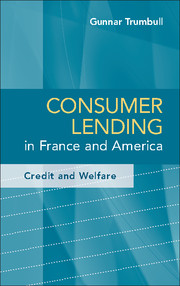Book contents
- Frontmatter
- Dedication
- Contents
- Figures and Tables
- 1 Introduction
- 2 Commercial Banks and Consumer Credit in the United States
- 3 Banks against Credit
- 4 American Retailers and Credit Innovation
- 5 Selling France on Credit
- 6 Credit and Reconstruction
- 7 The Politics of Usury
- 8 Credit for Being American
- 9 Deregulation and the Politics of Overindebtedness
- 10 Credit and Welfare
- Index
- References
7 - The Politics of Usury
Published online by Cambridge University Press: 05 August 2014
- Frontmatter
- Dedication
- Contents
- Figures and Tables
- 1 Introduction
- 2 Commercial Banks and Consumer Credit in the United States
- 3 Banks against Credit
- 4 American Retailers and Credit Innovation
- 5 Selling France on Credit
- 6 Credit and Reconstruction
- 7 The Politics of Usury
- 8 Credit for Being American
- 9 Deregulation and the Politics of Overindebtedness
- 10 Credit and Welfare
- Index
- References
Summary
Usury laws are the oldest and most common response to societal concerns about the high cost of consumer lending. They are politically attractive in that they seem to draw a hard line against exploitative lending. Where they have been used, they are supported by a coalition of religious conservatives and pro-welfare liberals. As often as they have been employed, though, usury laws have been equally criticized. Two strains of critique have dominated. France's liberal Finance Minister Anne-Robert-Jacques Turgot (1775), for example, decried interest-rate caps as an infringement on private contracts. British utilitarian Jeremy Bentham (1787), by contrast, argued against interest rate caps primarily on the grounds that restricting access to financial markets hurt the poor. Both critiques point to an apparent dilemma: interest rate caps seem to sacrifice access to credit in the interest of consumer protection. Yet, for small lenders in the postwar period, the reality of usury regulation was more nuanced, and the apparent policy dilemma of access versus protection more complicated.
The practical problem with interest-rate caps was that small loans were by their nature expensive to administer. Any interest rate that felt acceptable to the public – the biblical rate of 6 percent was a common reference point – made most small loans uneconomical. The fact that small lending still happened was a testimony to the ease with which the true costs of lending could be hidden. One way was through noninterest charges. Fees for late payments, agent commissions, credit insurance, and the reporting of interest as a discount were all common practices that had been accepted by regulators in order to allow lenders to charge higher effective interest rates than state usury caps seemed to allow. These workarounds meant that usury caps came at the cost of transparency, because they made it harder for consumers to assess and compare the total costs of loans. The second way to hide high interest charges was through cross-subsidies. When loans were tied to the sale of a specific product, revenue from the sale could be used to offset a lower interest rate charged to the consumer. Frequently, this meant that cash customers were subsidizing credit customers. Lenders also commonly provided a cross-subsidy among their borrowers, with the profits from larger loans going to offset losses from administering smaller loans.
- Type
- Chapter
- Information
- Consumer Lending in France and AmericaCredit and Welfare, pp. 146 - 167Publisher: Cambridge University PressPrint publication year: 2014



